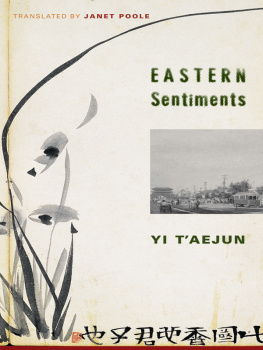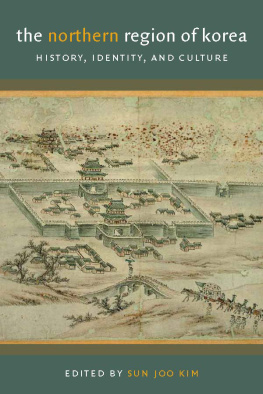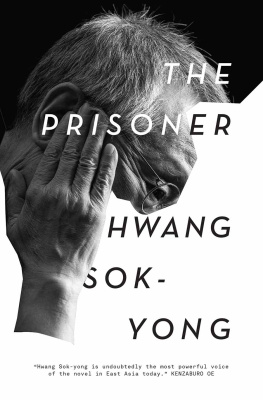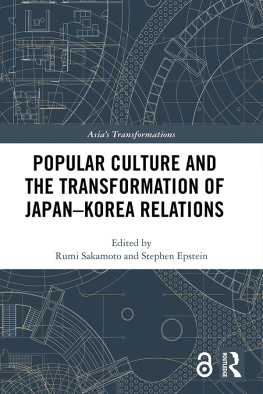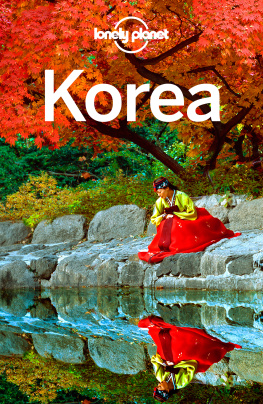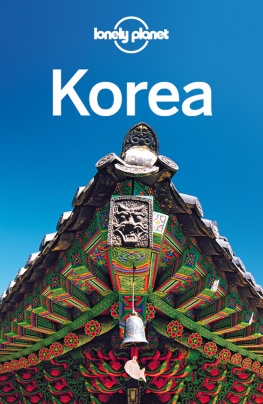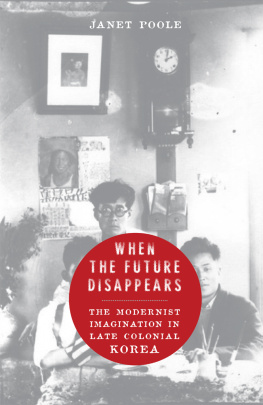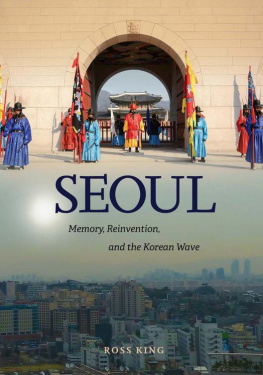For their generous help with this project, I would like to thank Hwang Jongyon, Sam Perry, Moss Roberts, Vincent Shen, and, most especially, Suh Jiyoung. This translation was initially undertaken with the help of a translators grant from the Korean Literature Translation Institute. A grant from the International Communication Foundation afforded me the time to further refine the manuscript. But still, this translation might not have reached any readers without support from Carol Gluck at the Weatherhead Institute and the dedication of Jennifer Crewe and all at Columbia University Press. I am extremely grateful, and I like to think that Yi Taejun would be too.
Upon visiting someones home, there is nothing I envy more than a room with a fine wall. Tall and wide, receiving only indirect sunlight, a wall as silent as if it were underwater how calm it feels to sit alone before such a wall and gaze upon an old picture; to saunter beside a wall while pondering ones thoughts; to gaze upon that wall with several friends, partaking in conversation of no import as night stealthily falls; and sometimes to replace the picture with another. What support we can find in such a wall each day and throughout our lives!
Yesterday I visited K in S hospital. Three beds were spread out generously in the newly built second-class ward, and before them there rose a long wall. The light was indirect and a cream-colored paint made the wall appear soft and dim.
We all agreed it was a fine wall. And we all agreed that it was wasted. Not a single fly had paused to rest on this splendid wall.
All the walls were the same. Here there was a door and there a window, but otherwise these expansive walls were all empty, like a desert. The convalescing patients could run their weary eyes over and over this desert, but with nowhere to rest they would soon have to lower their eyelids.
I considered the thought that the walls of a prison must be like this. And then, for the sake of my painter friend K, I felt the urge to take my fountain pen and draw even just one line of ink on that desertlike wall.
I yearn for such walls.
I want to hang an old picture in a fading scroll on a broad, dim wall and sit quietly beneath it. The more our lives lose their aura, the more I seem to yearn for walls.
I am watching the water.
As it flows by, the water is beautiful.
It seeps out from the earth and flows over the earth, but it is not dirty; it is as clear as when poured into a clean glass. It glides past the grass, raising ripples against the pebbles and happily singing as it flows beneath the blue sky.
The water is beautiful. The form and sound of its flow are beautiful, but even more beautiful is its pure virtue; it possesses that gentle virtue of not dirtying others and even cleanses them of their dirt. When we encounter water, how pure our hearts become; when we acquaint ourselves with water, how our bodies are cleansed!
One look at the water reveals that it harbors great joy. This is not only the joy of a song upon encountering rapids. There is also the great joy of an eternally unvoiced optimism. Instead of growing flustered when blocked by mountain after mountain, the water gathers and continues to gather quietly until it overflows another day. Whether poured into a jar or driven into narrow iron pipes underground, water still displays quiet forbearance and calm.
Water is sacred. It flows without interest; sea creatures live in its bosom, and rice paddies, fields, and orchards flourish because of its lack of worldly desire.
What creature does not benefit from the virtue of water?
Beautiful water, happy water, benevolent water the sage Laozi wrote, Perfect mastery works like water.
Laozi, Dao de jing, stanza 8.
Whenever I returned from Tokyo to Korea, I experienced the night anew.
Of course day and night exist there too, but, having accustomed myself to the well-lit stations in Japan, I would discover night again once the train had left Pusan and began to stop from time to time in the most unlikely of dark places. I would look out, wondering if the train had broken down, only to glimpse station employees flitting back and forth like bats, and then a closer inspection would reveal the flicker of an oil lamp in the distance.
Night, the true dark night! It was not a copy but the real thing that I felt then. And in that dark, deserted village my heart would embrace the comfortable feeling of having returned home.
Oh, what a desolate station
Some travelers must feel this way, but I was always thankful to find myself in such a dark station, after my nerves had been exhausted by life in the bright city and by my constantly passing through stations bedecked in lights. That feeling could only be surpassed by standing in front of some breathtaking scenery.
From that time on, I made a habit of enjoying the dark, unlit night. After I returned to Tokyo, I formed a group that met in unlit rooms; we friends would linger through the long night until day broke.
Although we see the night fall every day, still it takes us by surprise. And so sometimes I sit and wait from daylight hours. The night meanders in through the closed door. It removes my mothers face from a photograph hung on the wall, coils around a lone blossom on my desk, its eyes wide open to the very end, and then I find myself in the depth of the mountains.
There I encounter the cries of insects and wait for the dream that will surely visit; deep into the night I hear a cock crow in a village far away.
A friend returned from the field with a pear he had picked for me, saying,
Look, I found one already ripe.
I asked when he usually picked these pears, and he replied that it was only after the first frost. But, as he was walking along, he had found just one that had ripened early and fallen to the ground.
I took a bite, but it did not taste as good as it looked. It was tough, watery, and gave off a scent somehow lacking in purity.
As I tasted the salty water of this fruit that had ripened before its time, my thoughts turned by chance to those geniuses. Those who realize their talents early and die soon after.
Someone once said that when a genius dies early there should be no cause for sorrow. Within the span of such a short life the genius precociously reaches the predestined pinnacle of his natural talents and could achieve no more were he to live any longer. But, when a life should last at least seventy or eighty years, it is hard to believe it could be over at the age of twenty or thirty years.
I want to live a long life.
In order to write well, it is not enough to study, but necessary also to live long. I would like at least to live long enough to enjoy that wise and refined old age, which begins at the age of fifty, when we are supposed to know Heavens will, and then stretches on through sixty, seventy, one hundred. Like a ripe crab apple that has passed through the deep autumn of life, I want to fully ripen on life itself.
Life is full of joy!
Life is full of sorrow!
These lines are commonly written by those geniuses of twenty or thirty. But how can we know true joy or sorrow without entering into the autumn of life, those seventh and eighth decades that we call old age?
I feel a sudden urge to live a long life.
The day before yesterday was the most beautiful morning we have seen in Sngbuk-chng this spring. Azaleas and forsythias hung their smiling blossoms over every fence, apricot and cherry buds fattened themselves in preparation to bloom, and sparrows twittered among the forest of flowers as if they were the only ones to notice that the morning was so perfectly clear. And then, from a house across the other side of the stream, there arose a wild wail.

